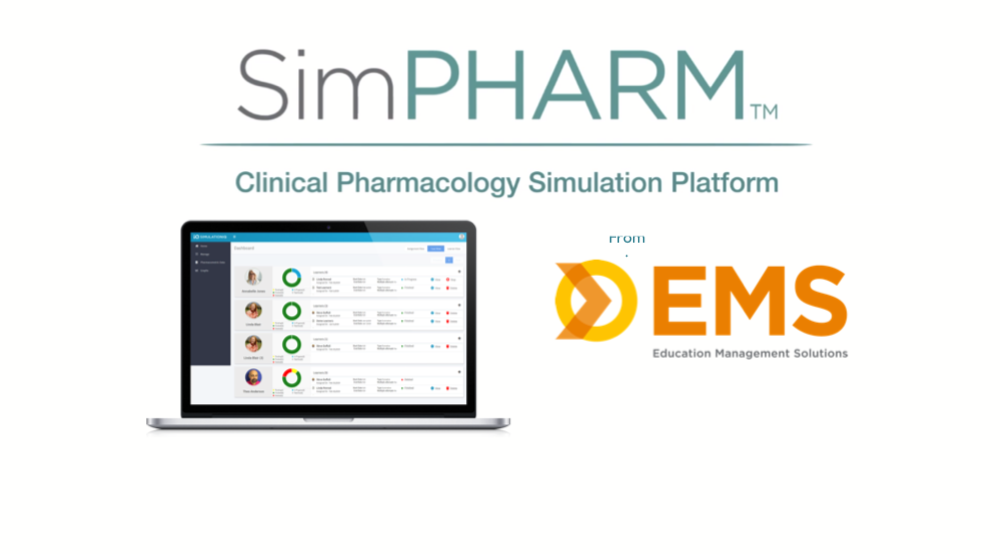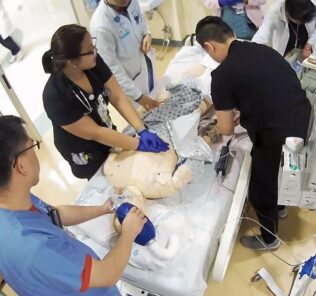SimPHARM Launches Brave New World for Simulated Pharmacy Learning
Education Management Solutions (EMS) and the University of Otago recently announced a revolution in pharmacy education with virtual serious gaming to bridge the gap between classroom learning and patient care with the all-new, web-based SimPHARM clinical pharmacology platform. Today we take a look at this innovative new Pharmacy Simulator, which helped Otago University move beyond a 30% adoption rate of student self prep for pharmacy cases to 95% adoption after implementing the SimPharm virtual game!
Developed in partnership with Professor Stephen Duffull of the University of Otago School of Pharmacy, New Zealand, SimPHARM gives pharmacy, medical, and nursing schools the framework they need to help students more effectively bridge the gap between classroom learning and nearly real patient care.
SimPHARM is a clinical therapeutic simulation tool that creates a realistic clinical experience in which one minute of virtual time equals one minute of real time. Ideal for flipped classroom learning environments, the platform’s cognitive game engine empowers students to develop their clinical decision-making skills at their own pace while under the supervision of faculty.
Sponsored Content:
“We are excited to partner with Professor Duffull and the University of Otago,” said Anurag Singh, President and CEO of EMS. “The SimPHARM solution is a welcome addition to EMS’ comprehensive suite of simulation management technologies and virtual training solutions for clinical education.
With this partnership, EMS and the University of Otago establish a new standard for pharmacy education that effectively prepares students for real world clinical practice. SimPHARM helps students develop critical real-time decision-making skills, and understand the consequences of those decisions through self-reflection, debriefing, and peer feedback.
SimPHARM utilizes a dynamic Case Based Learning (CBL) model. The faculty/instructor creates a case in which a patient presents with certain medical problems. The student begins the case by developing a care plan, initiating treatment, and observing the effects of the drugs being administered in real-time. The student can then make self-reflective notes, document justification for treatment, discuss the material with the faculty/instructor or other students, and complete the case with a final reflection. Ideal for flipped classroom learning environments, the SimPHARM real-time cognitive game engine empowers students to develop their clinical decision making skills at their own pace while under the supervision of faculty.
Sponsored Content:
As the flipped classroom model becomes more widely adopted, institutions are seeking out ways to give students access to educational content independently while under the guidance of a faculty member. SimPHARM empowers students to read, review, and learn material before entering the classroom. An instructor can simply and easily assign a SimPHARM case prior to class, allowing students to work at their own pace. Students can choose appropriate drugs and dosing regimens, order lab tests, and interact with interprofessional or medical teams while experiencing the consequences of their decisions and reflecting on case progress in real-time. Students are also given the opportunity to debrief their experiences and compare decisions with classroom peers.
“SimPHARM grew out of a desire to enhance the educational experience while putting students in the driver’s seat. Each case a student runs enhances their skill development, even when they’re working independently from an instructor,” said Professor Duffull. “Early results from School of Pharmacy students at the University of Otago have shown excellent engagement—and SimPHARM is more exciting for students than typical pre-reading requirements.
Visit the SimPHARM Website Today to Learn More!
Lance Baily, BA, EMT-B, is the Founder / CEO of HealthySimulation.com, which he started in 2010 while serving as the Director of the Nevada System of Higher Education’s Clinical Simulation Center of Las Vegas. Lance also founded SimGHOSTS.org, the world’s only non-profit organization dedicated to supporting professionals operating healthcare simulation technologies. His co-edited Book: “Comprehensive Healthcare Simulation: Operations, Technology, and Innovative Practice” is cited as a key source for professional certification in the industry. Lance’s background also includes serving as a Simulation Technology Specialist for the LA Community College District, EMS fire fighting, Hollywood movie production, rescue diving, and global travel. He and his wife live with their two brilliant daughters and one crazy dachshund in Las Vegas, Nevada.
Sponsored Content:


















